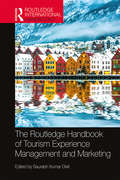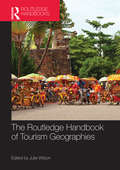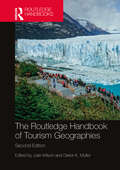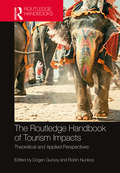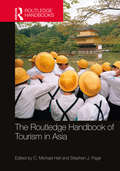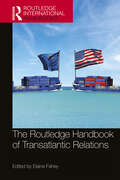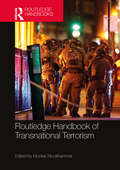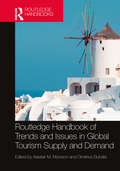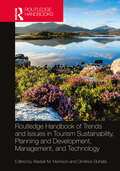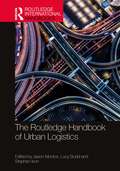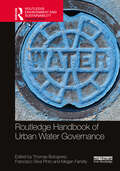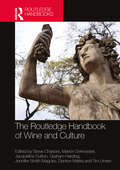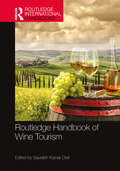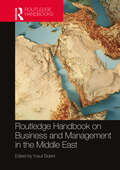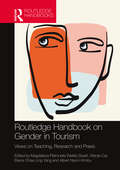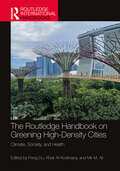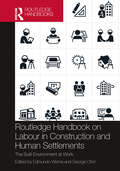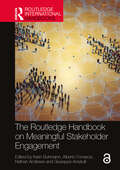- Table View
- List View
Routledge Handbook of Tourism Cities
by Alastair M. Morrison J. Andres Coca-StefaniakThe Routledge Handbook of Tourism Cities presents an up-to-date, critical and comprehensive overview of established and emerging themes in urban tourism and tourist cities. Offering socio-cultural perspectives and multidisciplinary insights from leading scholars, the book explores contemporary issues, challenges and trends. Organised into four parts, the handbook begins with an introductory section that explores contemporary issues, challenges and trends that tourism cities face today. A range of topics are explored, including sustainable urban tourism, overtourism and urbanisation, the impact of terrorism, visitor–host interactions, as well as reflections on present and future challenges for tourism cities. In Part II the marketing, branding and markets for tourism cities are considered, exploring topics such as destination marketing and branding, business travellers and exhibition hosting. This section combines academic scholarship with real-life practice and case studies from cities. Part III discusses product and technology developments for tourism cities, examining their supply and impact on different travellers, from open-air markets to creative waterfronts, from social media to smart cities. The final Part offers examples of how urban tourism is developing in different parts of the world and how worldwide tourism cities are adapting to the challenges ahead. It also explores emerging forms of specialist tourism, including geology and ecology-based tourism, socialist heritage and post-communist destination tourism. This handbook fills a notable gap by offering a critical and detailed understanding of the diverse elements of the tourist experience today. It contains useful suggestions for practitioners, as well as examples for theoretical frameworks to students in the fields of urban tourism and tourism cities. The handbook will be of interest to scholars and students working in urban tourism, heritage studies, human geography, urban studies and urban planning, sociology, psychology and business studies.
The Routledge Handbook of Tourism Experience Management and Marketing (Routledge International Handbooks)
by Saurabh Kumar DixitThe Routledge Handbook of Tourism Experience Management and Marketing offers a comprehensive and thorough inquiry into both customary and emergent issues of tourism experience and co-creation. Drawing together contributions from 83 authors from 28 countries with varied backgrounds and interdisciplinary interests, the handbook highlights multiple representations and interpretations of the theme. It also integrates a selection of illustrative global case studies to effectively present its chapter contents. Tourism experience drives the contemporary tourist’s behavior as they travel in pursuit of experiencing unique and unusual destinations and activities. Creating a memorable and enduring experience is therefore a prerequisite for the all tourism business organizations irrespective of the nature of their products or services. This handbook focuses on conceptualizing, designing, staging, managing and marketing paradigms of tourism experiences from both supply and demand perspectives. It sheds substantial light on the contemporary theories, practices and future developments in the arena of experiential tourism management and marketing. Encompassing the latest thinking and research themes, this will be an essential reference for upper-level students, researchers, academics and industry practitioners of hospitality as well as those of tourism, gastronomy, management, marketing, consumer behavior, cultural studies, development studies and international business, encouraging dialogue across disciplinary boundaries.
The Routledge Handbook of Tourism Geographies
by Julie WilsonGeographical analysis of tourism spaces and places is advancing fast. In terms of human geography, the various recent academic ‘turns’ have led to fresh examination of existing debates and have advanced new theoretical ideas in geography that are more salient than ever for tourism studies. The Routledge Handbook of Tourism Geographies seeks to examine such recent developments by providing a state-of-the-art review of the field, documenting advances in research and evaluating different perspectives, approaches, techniques and contexts. The Routledge Handbook of Tourism Geographies considers recent disciplinary developments (including post-disciplinarily) in geography in relation to the study of tourism. It also analyzes the fledging relationships of the new mobilities paradigm, critical tourism studies and cultural political economy to tourism spaces and places, as well as acknowledging a spatial turn in poststructuralist social sciences more generally. In addition, it evaluates how postcolonial, feminist, sensory, performative and queer perspectives have diversified research in the tourism geographies field. Spatial analysis, time geography, placemaking and landscape concerns are addressed and issues such as transport, environmental discourses and development are also analyzed. Finally, the volume’s contributions highlight key areas for advancing research and map out the dimensions of future trajectories in tourism geographies in different theoretical and thematic contexts. Written by leading scholars in the tourism geographies field, this text will provide an invaluable resource for all those with an interest in tourism geographies, encouraging dialogue across disciplinary boundaries and areas of study.
The Routledge Handbook of Tourism Geographies
by Julie Wilson Dieter K. MüllerThe Routledge Handbook of Tourism Geographies, 2nd Edition, offers a comprehensive re-evaluation of the recent developments; conceptual, theoretical and empirical debates; and critical issues in this field of study.Reflecting on and building from its original aim of rethinking geographical approaches to tourism, the volume explores contemporary tourism contexts and concepts, as marked by the present era of polycrises, setting out renewed and reoriented perspectives on tourism geographies into the mid-2020s. Across its diverse range of contributions, the Handbook navigates the complexities of tourism as a shifting construct, situating tourism geographies within the socio-spatial, economic and environmental implications of tourism, leisure and mobilities in the new contexts of global change, ecological transition and digital transformation. The volume aims to provide a nuanced and detailed analysis of established and emerging discourses and debates within tourism geographies, underscoring the field’s inherent criticality and ideal positioning for understanding and catalysing complex global and local scenarios in contemporary tourism, leisure and mobilities.Written by leading scholars in the tourism geographies field, this text is an invaluable resource for students, researchers and scholars working in the areas of tourism, geography and related disciplines, encouraging dialogue across areas of study.
The Routledge Handbook of Tourism Impacts: Theoretical and Applied Perspectives
by Dogan Gursoy Robin NunkooThis handbook explores and critically examines both positive and negative impacts of tourism development focusing on the past, present and future issues, challenges and trends from a multidisciplinary global perspective. Through a comparative approach involving international case studies, this book explores our understanding of tourism impacts and contributes to the theoretical development on relationships between tourism impacts and community support for tourism development. This handbook focuses on a variety of geographical locations, drawing from the knowledge and expertise of highly regarded academics from around the world. Specifically, it explores the adoption and implementation of various tourism development and impact management approaches in a wide range of global contexts, while identifying their trends, issues and challenges. It addresses strategies relating to innovation, sustainability and social responsibility, and critically reviews the economic, sociocultural, environmental, political and technological impacts of tourism. The text also identifies future trends and issues, as well as exploring the methods used to study tourism impacts. Conveying the latest thinking and research, this handbook will be a key reference for students, researchers and academics of tourism, as well as development studies, geography, cultural studies, sustainability and business, encouraging dialogue across disciplinary boundaries and areas of study.
The Routledge Handbook of Tourism in Asia
by C. Michael Hall Stephen J. PageAsia is regarded as the fastest growing area for international and domestic tourism in the world today and over the next 20 years. Given the economic, social and environmental importance of tourism in the region, there is a need for a comprehensive and readable overview of the critical debates and controversies in tourism in the region and the major factors that are affecting tourism development both now and in the foreseeable future. This Handbook provides a contemporary survey of the region and its continued growth and development as a key destination and generator of tourism, which is marked by a high proportion of intra-regional travel. The book is divided into five sections. This first section provides an introduction to the region and context to the nationally focused chapters. The next three sections are then broadly based on the three UNWTO Asian regions: South-East Asia, South and Central Asia, and East and North-East Asia, providing readers with a valuable snapshot of tourism at various scales, and from various approaches and positions. The concluding section considers future prospects for tourism in Asia. The handbook is interdisciplinary in coverage and is also international in scope through its authorship and content. It presents a range of perspectives and understanding of the processes and forces that are shaping tourism in this fascinating and dynamic region that is one of the focal points of global tourism. This is essential reading for students, researchers and academics interested in tourism in the growth region of Asia now and in the future.
The Routledge Handbook of Tourism Marketing
by Scott McCabeTourism has often been described as being about ‘selling dreams’, tourist experiences being conceptualized as purely a marketing confection, a socially constructed need. However, the reality is that travel for leisure, business, meetings, sports or visiting loved ones has grown to be a very real sector of the global economy, requiring sophisticated business and marketing practices. The Routledge Handbook of Tourism Marketing explores and critically evaluates the current debates and controversies inherent to the theoretical, methodological and practical processes of marketing within this complex and multi-sector industry. It brings together leading specialists from range of disciplinary backgrounds and geographical regions to provide reflection and empirical research on this complex relationship. The Handbook is divided in to nine inter-related sections: Part 1 deals with shifts in the context of marketing practice and our understanding of what constitutes value for tourists; Part 2 explores macromarketing and tourism; Part 3 deals with strategic issues; Part 4 addresses recent advances in research; Part 5 focuses on developments in tourist consumer behaviour; Part 6 looks at micromarketing; Part 7 moves on to destination marketing and branding issues; Part 8 looks at the influence of technological change on tourism marketing; and Part 9 explores future directions. This timely book offers the reader a comprehensive synthesis of this sub-discipline, conveying the latest thinking and research. It will provide an invaluable resource for all those with an interest in tourism and marketing, encouraging dialogue across disciplinary boundaries and areas of study. This is essential reading for Tourism students, researchers and academics as well as those of Marketing, Business, Events Management and Hospitality Management.
The Routledge Handbook of Tourism Research
by Cathy H. C. Hsu William C. GartnerThe Routledge Handbook of Tourism Research is a compendium of some of the most relevant issues affecting tourism development today. The topics addressed in this book provide some new thinking for those involved in tourism research. This book takes the reader from the beginnings of tourism research to a discussion of emerging forms of tourism and selected examples of tourism development. The underlying theoretical dimensions are reviewed, analysed and discussed from a number of perspectives. This book brings together leading researchers, many of whom are members of the International Academy for the Study of Tourism, to discuss tourism today and its future. The works included in this volume are diverse, in terms of geographical context, research methodology, root discipline, and perspective. This book represents studies based in Europe, North America, Oceania, and Asia. Research methodologies include both quantitative and qualitative. Both macro and micro issues are discussed from the economic, psychological, sociological, political science, marketing, and other perspectives, which reflect the interdisciplinary nature of tourism studies. This book is divided into 6 sections. Section 1 considers the foundations for tourism research. Section 2 discusses the implications for destination management and section 3 discusses planning for tourism development. Section 4 covers human capital for tourism development. And finally, section 5 evaluates emerging forms of tourism and then section 6 offers insights into tourism evolution. It offers the reader a comprehensive synthesis of this field, conveying the latest thinking and research. The text will provide an invaluable resource for all those with an interest in tourism research. This is essential reading for students, researchers & academics of Tourism as well as those of related studies in particular Leisure, Hospitality & Development Studies.
The Routledge Handbook of Transatlantic Relations (Routledge International Handbooks)
by Elaine FaheyThe Routledge Handbook on Transatlantic Relations is an essential and comprehensive reference for the regulation of transatlantic relations across a range of subjects, bringing together contributions from scholars, policy makers, lawyers and political scientists. Future oriented in a range of fields, it probes the key technical, procedural and policy issues for the US of dealing with, negotiating, engaging and law-making with the EU, taking a broad interdisciplinary perspective including international relations, politics, political economic and law, EU external relations law and international law and assesses the external consequences of transatlantic relations in a systematic and comprehensive fashion. The transatlantic relationship constitutes one of the most established and far-reaching democratic alliances globally, and which has propelled multilateralism, trade regulation and the EU-US relationship in global challenges. The different contributions will propose solutions to overcome these problems and help us understand the shifting transatlantic agenda in diverse areas from human rights, to trade, and security, and the capacity of the transatlantic relationship to set new international agendas, standards and rules. The Routledge Handbook on Transatlantic Relations will be a key reference for scholars, students and practitioners of Transatlantic Relations/EU-US relations, EU External Relations law, EU rule-making, EU Security law and more broadly to global governance, International law, international political economy and international relations.
Routledge Handbook of Transnational Terrorism
by Nicolas StockhammerThis handbook provides contributions by some of the world-leading experts in the field on recent phenomena and trends in transnational terrorism. Based on the methodological approach of a trend-and-key factor analysis of transnational terrorism and processed on the virtual platform "Foresight Strategy Cockpit" (FSC), the volume seeks to examine what potential future variants of transnational terrorism may evolve. Focusing on the latest structural developments in the sphere of politically or religiously motivated violence, the handbook considers the tactical, strategic, and not least the systemic dimension of terrorism. Divided into seven thematic sections, the handbook’s contributions cover a wide range of issues, dealing among others with strategic and hybrid terrorism, the systemic dimension of extremist violence, prevalent actors, counter-narratives, the crime terror-nexus, the role of digitalization and the spiral dynamic between Islamist and right-wing terrorism. The expert contributions provide a condensed overview of current developments, structural linkages and important academic debates centering around transnational salafi-jihadi terrorism, but also right-wing terrorism and counter-terrorism. A key objective of the work is to make the effects of prevention/preemption, (de-) radicalization and (non-) intervention both transparent and assessable. As such, it contributes well-founded strategies, feasible solutions and options for policy-makers and counter-terrorism experts. This volume will be of great interest to students of terrorism and counter-terrorism, political violence and security studies.
Routledge Handbook of Trends and Issues in Global Tourism Supply and Demand
by Alastair M. Morrison Dimitrios BuhalisThis Handbook provides a comprehensive overview of trends and issues in the global supply and demand on tourism. With contributions from 70 authors, this Handbook showcases a diverse range of perspectives with insights from around the globe. It reviews the interactions among trends and issues, and it emphasises the importance of tracking and interpreting these on a global scale. The book is organized into three parts, with Part I focusing on supply-side trends including transport, attractions, culture, heritage tourism, technology, policies, and destination management. Part II critically reviews the external factor trends, including the impact of terrorism, multi-crisis destinations, Generation Z’s important contributions to the sector, the regulation of sharing economy platforms and nature tourism in future. Part III focuses on market-led trends such as bleisure, glamping, VFR travel, transformational tourism and new trends in wellness tourism following the post-COVID era. The book also provides predictions for the upcoming decades. This Handbook will be a vital tool for researchers, students, and practitioners in the tourism and hospitality sector to further develop their knowledge and expertise in the field. It examines business and policy implications, offering guidance for developing sustainable competitive advantage.
Routledge Handbook of Trends and Issues in Tourism Sustainability, Planning and Development, Management, and Technology
by Alastair M. Morrison Dimitrios BuhalisThe Handbook offers a comprehensive overview of theoretical and practical perspectives for tracking and interpreting trends and issues in tourism sustainability, planning and development, management, and technology. Tourism is a dynamic and unpredictable industry and understanding its trends and issues is critical for the successful and sustainable development of the private and public sector. As such, this Handbook proposes clear definitions and provides a systematic classification scheme for such analysing. It reviews trends and issues in four thematic areas of tourism: sustainability; planning and development; management and technology with contributions from 83 leading tourism scholars from across the globe. The Handbook provides insights on the differences among domestic, outbound, and inbound markets and acknowledges that the supply sub-sectors of tourism are diverse, highlighting variations by geographic regions. The book emphasises the necessity to prioritise sustainability and the achievement of the UN's Sustainable Development Goals (SDGs). Students and professionals interested in tourism, hospitality, and sustainability will find a wealth of multidisciplinary knowledge in this Handbook.
The Routledge Handbook of Urban Logistics (Routledge International Handbooks)
by Jason Monios Lucy Budd Stephen IsonThe Routledge Handbook of Urban Logistics offers a state-of-the-art, comprehensive overview of the discipline of urban and city logistics. The COVID-19 pandemic and the rise in internet shopping in particular have placed new demands on urban logistics which require innovative technological and policy responses. Similarly, the necessity for sustainable urban logistics offers both a challenge and opportunity for development and seeks to address traffic congestion, local air quality, traffic-related degradation, the use of energy, safety aspects and noise. Featuring contributions from world-leading, international scholars, the chapters examine concepts, issues and ideas across five topic areas that reflect the increasingly diverse nature of current research and thinking in urban logistics: transport modes, urban logistics sectors, technical analysis, policy, and sustainability. Each chapter provides an overview of current knowledge, identifies issues and discusses the relevant debates in urban logistics and the future research agenda. This handbook offers a single repository on the current state of knowledge, written from a practical perspective, utilising theory that is applied and developed using real-work examples. It is an essential reference for researchers, academics and students working in all areas of urban logistics, from policy and planning to technology and sustainability, in addition to industry practitioners looking to develop their professional knowledge.
Routledge Handbook of Urban Water Governance (Routledge Environment and Sustainability Handbooks)
by Thomas Bolognesi, Francisco Silva Pinto and Megan FarrellyThis handbook provides a comprehensive, state-of-the-art overview of urban water governance. Of the many growing challenges presented by rapid urbanization, water governance is a critical one and while urban water governance is now regarded as a critical field of research, the literature is fragmented. For the first time, this handbook brings together urban water governance research, containing interdisciplinary contributions from established and emerging scholars, practitioners, and policymakers. It addresses the key questions of how urban water governance works, how is it shaped, and what the impacts are. The handbook's structure offers a progressive entry into the complexity of urban water governance. Starting with technical dimensions, the handbook addresses supply and demand, wastewater, and sanitation. It then considers regulation and economic factors, examining water utilities and services. Political processes, and the actors involved, are addressed and the handbook finishes with a part focusing on governance and sustainability, where chapters address critically important topics such as access to water, water safety, and water security. This handbook is essential reading for students, scholars, and professionals interested in urban water governance, urban studies, and water resource management and sustainability more broadly.
The Routledge Handbook of Volunteering in Events, Sport and Tourism
by Kirsten HolmesThis timely handbook examines the most contemporary, controversial and cutting-edge issues related to the involvement of volunteers in the fields of events, sport and tourism. Split into thematic sections, the primary areas covered include: key disciplinary approaches to understanding volunteerism, international contexts, managing volunteers, the impacts and legacies of volunteering and future trends in these sectors including online and digital volunteering. Commonalities and differences of volunteering in these sectors are drawn out throughout the volume. A diverse range of case studies are examined including the 2007 UEFA Under 21 Championship hosted by Poland, the development of the Appalachian National Scenic Trail, the Vancouver, London and Pyeong Chang Olympic Games, Belgium’s National Day in 2019, the Puffing Billy railway in Australia, as well as many other examples looking at destination services organizations, museums, grassroots associations, corporate events, community events and visitor attractions. Drawing on the academic and practical expertise of over 50 authors from across the globe, the handbook provides an invaluable resource for all those with an interest in volunteering in these sectors, encouraging dialogue across disciplinary boundaries and areas of study in order to advance volunteering research and practice in the fields of events, sport and tourism.
Routledge Handbook of Water Economics and Institutions (Routledge Environment and Sustainability Handbooks)
by Kimberly Burnett Richard Howitt James A. Roumasset Christopher A. WadaGrowing scarcity of freshwater worldwide brings to light the need for sound water resource modeling and policy analysis. While a solid foundation has been established for many specific water management problems, combining those methods and principles in a unified framework remains an ongoing challenge. This Handbook aims to expand the scope of efficient water use to include allocation of sources and quantities across uses and time, as well as integrating demand-management with supply-side substitutes. Socially efficient water use does not generally coincide with private decisions in the real world, however. Examples of mechanisms designed to incentivize efficient behavior are drawn from agricultural water use, municipal water regulation, and externalities linked to water resources. Water management is further complicated when information is costly and/or imperfect. Standard optimization frameworks are extended to allow for coordination costs, games and cooperation, and risk allocation. When operating efficiently, water markets are often viewed as a desirable means of allocation because a market price incentivizes users to move resources from low to high value activities. However, early attempts at water trading have run into many obstacles. Case studies from the United States, Australia, Europe, and Canada highlight the successes and remaining challenges of establishing efficient water markets.
The Routledge Handbook of Wine and Culture
by Steve Charters Marion Demossier Jacqueline Dutton Graham Harding Jennifer Smith Maguire Denton Marks Tim UnwinThe link between culture and wine reaches back into the earliest history of humanity. The Routledge Handbook of Wine and Culture brings together a newly comprehensive, interdisciplinary overview of contemporary research and thinking on how wine fits into the cultural frameworks of production, intermediation and consumption. Bringing together many leading researchers engaged in studying these phenomena, it explores the different ways in which wine is constructed as a social artefact and how its representation and use acquire symbolic meaning. Wine can be analysed in different ways by varying disciplines involved in exploring wine and culture (anthropology, economics and business, geography, history and sociology, and as text). The Handbook uses these as lenses to consider how producers, intermediaries and consumers use and create cultural significance. Specifically, the work addresses the following: how wine relates to place, belief systems and accompanying rituals; how it may be used as a marker of the identity and mechanisms of civilising processes (often in conjunction with food and the arts); how its framing intersects with science and nature; the ideologies and power relations which arise around all these activities; and the relation of this to wine markets and public institutions. This is essential reading for researchers and students in education for the wine industry and in the humanities and social sciences engaged in understanding patterns of human ingenuity and interaction, such as sociology, anthropology, health, geography, business, tourism, cultural studies, food studies and history.
Routledge Handbook of Wine Tourism
by Saurabh Kumar DixitWine tourism or enotourism or oenotourism or winery tourism or vinitourism is a special interest tourism that empowers local culture and spawns business opportunities for the local community. The comprehensive Routledge Handbook of Wine Tourism offers a thorough inquiry into both regular and emerging issues of wine tourism. Modern wine tourism extends beyond the mere cultivation of grapes and the production and selling of wine. The Routledge Handbook of Wine Tourism examines the complex interplay of market profiling, sustainable regional development, and innovative experiential marketing constructs which, when successful, contribute to the growth and sustainable evolution of global wine tourism. This handbook examines how the success of various enotourism events such as vineyard visits, winery tours, wine festivals and wine trails can stimulate the development of wine-producing regions and territories. Incorporating the latest philosophies and research themes, this handbook will be an essential reference for students, researchers, academics and industry practitioners of hospitality and tourism, gastronomy, management, marketing, cultural studies, development studies, international business and for encouraging dialogue across disciplinary boundaries.
Routledge Handbook on Business and Management in the Middle East
by Yusuf SidaniThis Handbook provides thorough insights into crucial topics that have attracted scholarly and practitioner interest in business and management in the Middle Eastern region.The chapters of this Handbook open the window on the key areas of discussion in the field over the past few decades, including organizational behavior, leadership, business culture, business ethics, human resources, business strategy, entrepreneurship, finance, and accounting. It starts with identifying five key themes emerging from the variety of topics, locations, and questions addressed by the various authors who contributed to this volume. The remaining 30 chapters tackle various topics of interest to the research and the practitioner: institutional contexts for doing business in the region; issues of leadership, ethics, and organizational behavior; the role of women in leadership and some of the obstacles facing aspirant women leaders; people management and human resources issues in the Middle East; marketing in the Middle East; and strategy and entrepreneurship in the Middle East. The book closes with a reflection on management research in non-Western societies and describes some methodological challenges and propositions.The Handbook is designed for academics, students, and practitioners covering areas of relevance across business activities, functions, and locations in the Middle East. It is to be used as a reference for scholars doing business research or teaching and for practitioners involved in business activities in the region.
The Routledge Handbook on Extraterritorial Human Rights Obligations (Routledge International Handbooks)
by Mark Gibney Gamze Erdem Türkelli Markus Krajewski Wouter VandenholeThe Routledge Handbook on Extraterritorial Human Rights Obligations brings international scholarship on transnational human rights obligations into a comprehensive and wide-ranging volume. Each chapter combines a thorough analysis of a particular issue area and provides a forward-looking perspective of how extraterritorial human rights obligations (ETOs) might come to be more fully recognized, outlining shortcomings but also best state practices. It builds insights gained from state practice to identify gaps in the literature and points to future avenues of inquiry. The Handbook is organized into seven thematic parts: conceptualization and theoretical foundations; enforcement; migration and refugee protection; financial assistance and sanctions; finance, investment and trade; peace and security; and environment. Chapters summarize the cutting edge of current knowledge on key topics as leading experts critically reflect on ETOs, and, where appropriate, engage with the Maastricht Principles to critically evaluate their value 10 years after their adoption. The Routledge Handbook on Extraterritorial Human Rights Obligations is an authoritative and essential reference text for scholars and students of human rights and human rights law, and more broadly, of international law and international relations as well as to those working in international economic law, development studies, peace and conflict studies, environmental law and migration.
Routledge Handbook on Gender in Tourism: Views on Teaching, Research and Praxis
by Magdalena Petronella Swart Wenjie Cai Yang, Elaine Chiao Ling Albert Nsom KimbuThis comprehensive handbook delves into the multifaceted dimensions of the role of gender in tourism, spanning education, research, and practice. With 40 international contributions from leading thinkers in the field, this book brings together diverse themes such as entrepreneurship, mobility, sustainability, and sexuality. In doing so it shatters traditional boundaries and dissects how gender influences perceptions, experiences, and opportunities, advocating for equality and challenging entrenched power dynamics. Informed by the United Nation's Gender Equality goals, this handbook champions the potential of gender-aware tourism to reshape the world by fostering inclusivity, empowerment, and understanding. It adopts diverse insights, encompassing feminist and queer perspectives, challenging norms, and exploring marginalised voices. By dissecting gender in educational, entrepreneurial, and research contexts, it unveils hidden dynamics. This book empowers readers to grasp the breadth of gender's role and equips them with tools to foster equality and reshape the tourism landscape, while making suggestions for future research agendas.This book is intended for scholars, educators, researchers, government officials and practitioners in the fields of gender studies, tourism, education, entrepreneurship, employment, mobility, research, sustainability, and sexuality.
The Routledge Handbook on Greening High-Density Cities: Climate, Society and Health (Routledge International Handbooks)
by Kheir Al-Kodmany Peng Du Mir M. AliThis new handbook provides a platform to bring together multidisciplinary researchers focusing on greening high-density agglomerations from three perspectives: climate change, social implications, and people’s health. Written by leading scholars and experts, the chapters aim to summarize the “state-of-the-art” and produce a reference book for policymakers, practitioners, academics, and researchers to study, design, and build high-density cities by integrating green spaces. The topics covered in the book include (but are not limited to) Urban Heat Island, Green Space and Carbon Sequestration, Green Space and Social Equity, Green Space and Public Health, Biophilic Cities, Urban Agriculture, Vertical Farms, Urban Farming Technologies, Nature and Biodiversity, Nature and Health, Biophilic Design, Green Infrastructure, Urban Revitalization, Post-Covid Cities, Smart and Resilient Cities, Tall Buildings, and Sustainable Vertical Cities.
The Routledge Handbook on Karl Polanyi (Routledge International Handbooks)
by Michele Cangiani Claus ThomasbergerKarl Polanyi is one of the most influential social scientists of our era. A report of the United Nations Conference on Trade and Development (UNCTAD) begins by noting that we are in a "Polanyi era": a time of dangerously unregulated markets, where the greatest need for decisive political action is matched by the least trust in politics. This handbook provides a comprehensive of recent research on Polanyi’s work and ideas, including the central place occupied by his thinking on the relationship between economics and politics. The stellar line-up of contributors to this book explore Polanyi’s work reflecting the intrinsic interdisciplinarity of Polanyi’s approach to understanding our society, its place in history, its fundamental dynamics, and its contradictions, as well as the methodological issues he raises. The handbook broadly follows a chronological structure beginning with influences on Polanyi, his formative experiences and early works. A significant section is dedicated to Polanyi’s seminal work, The Great Transformation, and its impact. Further sections also look at Polanyi’s wider influence, on various disciplines and methodological debates, and his ongoing relevance for present-day issues including debates on populism, neoliberalism and low carbon transitions. This handbook is a vital resource for students and scholars of economics, politics, sociology, and other social sciences.
Routledge Handbook on Labour in Construction and Human Settlements: The Built Environment at Work
by Edmundo Werna George OforiRoutledge Handbook on Labour in Construction and Human Settlements presents a detailed and comprehensive examination of the relationship between labour and the built environment, and synergises these critical focus areas in innovative ways. This unrivalled edited collection of chapters analyses problems and presents possible solutions related to the employment and conditions of workers in the construction industry. It provides comprehensive coverage of the relationship between the global workforce and the built environment and is divided into four topical areas: how labour and the built environment relate to development; employment generation in the built environment; quality of employment in the built environment; and the impact of the built environment on labour in other sectors. Underpinning the entire book is the premise that the way the built environment is produced, and its main products – buildings, cities and towns – have an impact on large numbers of workers. At the same time, the quality of the built environment requires construction workers who are well trained and with good working conditions. While cities and towns are the engines of economic growth, they will not be able to fulfil their economic potential if poverty in the workforce is not addressed. Those who are unemployed, underemployed or work in unfavourable conditions cannot fully contribute to production, and at the same time are limited in their ability to purchase goods and services – therefore limiting economic growth and restricting improvements in their living standards. In addition, investments in infrastructure, housing and inner-city redevelopment cannot be sustainable if labour issues – i.e., poverty – are not addressed. This book aims at analysing this complex set of issues comprehensively and will be essential reading to a wide range of researchers across the interdisciplinary intersections of construction, business and management, economic development, urban studies, sociology, political science and project management.
The Routledge Handbook on Meaningful Stakeholder Engagement (Routledge International Handbooks)
by Karin Buhmann Alberto Fonseca Nathan Andrews Giuseppe AmatulliMeaningful Stakeholder Engagement (MSE) is both a concept and a management approach, drawing on a combination of theoretical and applied knowledge areas (e.g., impact assessment, business and human rights, and stakeholder theory). MSE has become a key element of corporate sustainability risk-based due diligence as a process that responsible business enterprises are expected to apply to identify and manage harmful impacts on the environment and society.Despite the obvious and growing relevance of meaningful stakeholder engagement, few publications have tried to synthesize the knowledge, academic literature, and practical experience within and around the concept and practices. This volume responds to that knowledge gap through the provision of comprehensive interdisciplinary perspectives. Embodying a rights-holder orientation, The Routledge Handbook on Meaningful Stakeholder Engagement emphasizes the importance of MSE for stakeholders who are or can be affected by activities driven by external actors, such as natural resource extraction or processing; infrastructure; development proposals, planning and implementation; and production for industry or consumption.This handbook offers four thematic sections, all interdisciplinary in character, seeking to explore the multiple aspects of MSE. Moreover, a comprehensive introductory chapter explains key elements of the concept and causes for the current surge in expectations of MSE, including a rise in demands of risk-based due diligence. More than 40 international contributors combine theory and practice in chapters that discuss and elaborate the theory and practice of MSE. Uniquely, each section includes short practice notes based on experiences or dilemmas lived by practitioners or affected people, placing real-life situations into theoretical context. The concluding chapter draws up key insights from the chapters and practice notes, and casts a path for the future of MSE integrating values, norms, and practice.Cutting across multiple disciplines including stakeholder theory, natural resource management, impact assessment, project management, ESG, responsible business, and global value chains, The Routledge Handbook on Meaningful Stakeholder Engagement will be an essential resource for scholars, researchers, developers, investors, affected people, civil society organizations, students, and others.The Open Access version of this book, available at http://www.taylorfrancis.com, has been made available under a Creative Commons Attribution-Non Commercial-No Derivatives (CC-BY-NC-ND) 4.0 license.

